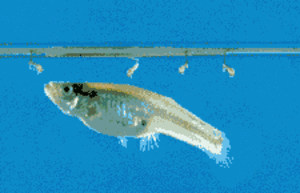Mosquitoes are a big problem and set to get bigger as the U.S. becomes warmer. You may have noticed the revised Hardiness Zone Map, released by the Arbor Day Foundation, and you’ve probably seen the often hysterical news coverage of mosquito-borne diseases. I’m going to talk about ways of dealing with mosquitoes without resorting to chemicals, but first…the chemicals.
In environmental law class, we learned that residues from our mosquito-control spray trucks are ending up in Europe. Do we know what these chemicals are? Somebody knows. Do we know what damage they can cause to other creatures? Somebody knows. The point is that when you target a pest species, you’re likely to inadvertently attack other species as well, especially those that eat the pests. Amphibians have been shown to be especially sensitive to chemical toxins. Spraying is also a rather useless way of dealing with mosquitoes. You basically have to load the air with the chemical to affect mosquitoes in the immediate vicinity, and the wind then disperses the chemical to the point of not being effective. Mosquitoes are so small that they can fly right by the toxins in the air.
Someone will bring up the infamous mosquito zapper here. These indiscriminately kill insects, and they will take a toll on the beneficial insects that eat mosquitoes. This leaves you with more mosquitoes. Go figure. You can then buy another zapper, or keep reading. Someone else will bring up repellents like DEET. Way back when, in April of 1998, the EPA decided that DEET was no longer safe for use on children. I don’t remember ever hearing anything about this, and google tells me that DEET is still being marketed as safe for children.
So the two main reasons to look for another way of killing mosquitoes are: you don’t want to kill beneficial species, and mosquito control by chemicals is ineffective and/or dangerous.
How about an organic way of killing mosquitoes that has been shown to work for thousands of years?
Now the good news. Dealing with a mosquito infestation isn’t that difficult. First, and most obviously, look for stagnant water pooling around your area. Where there are tires collecting rainwater, there are mosquitoes. Where there is stagnant water, there will be mosquitoes. Between raining, your water needs to be in a barrel or in the ground. Second, you want to pay attention to and promote those critters that eat mosquitoes, and there are many of them, as you might expect. The essence of organic is working with nature’s systems of control.
Tell me you have a small pond on your property, or in your garden, and I’ll tell you to get some guppies. Yes, the common guppy is not overly sensitive to chemicals and loves to eat mosquito larvae. At the edge of your pond should be planted some cattails and bulrushes, which will draw in dragonflies. Dragonflies eat the grown mosquito, and they are beautiful creatures.
Purple martins are the happiest mosquito-eating birds out there. Most of them in the south live in homes humans have specially made for them. Get yourself a good Purple Martin apartment home. They like to live in colonies, which provides protection from the meanie sparrows and other pests. These guys pick off mosquitoes in the same way that falcons will pick off a sparrow.
Frogs are my favorite. If you want more frogs, then do something to stop the spray-trucks and any other chemical dumping in your environment. Frogs like it clean, and they need no special help from us to live and eat.
Finally, bats are a new one for me, and I can’t wait to experiment. They will eat between 600 and 1,000 insects in an hour. They will also produce, specially for you, guano. Guano, before WWII ended and cheap fertilizers hit the market, was revered as the number one source of everything a growing plant needs. Guano means tastier tomatoes with more antioxidants and better soil. You can buy or build a bat condo to attract these guys.
Helping one or more of the creatures listed above will lower your mosquito population. The effect will be cumulative from year to year. It won’t be long until you’re sitting on the porch, enjoying a Mint Julep and a warm southern evening, without having to slap yourself every minute to get rid of a blood-sucking vampire. And take this idea with you into other areas: Every creature on this planet is food for another creature. The bats say, “Make mine organic, please!”
Reference:
- A Comprehensive Look at Controlling Mosquitoes www.getipm.com/thebestcontrol/chapter-23/Mosquitos-Part2.htm
